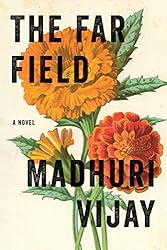The Far Field
Madhuri Vijay, 2019
Grove/Atlantic
448 pp.
ISBN-13: 9780802128409
Summary
Gorgeously tactile and sweeping in historical and socio-political scope, Pushcart Prize-winner Madhuri Vijay’s The Far Field follows a complicated flaneuse across the Indian subcontinent as she reckons with her past, her desires, and the tumultuous present.
In the wake of her mother’s death, Shalini, a privileged and restless young woman from Bangalore, sets out for a remote Himalayan village in the troubled northern region of Kashmir.
Certain that the loss of her mother is somehow connected to the decade-old disappearance of Bashir Ahmed, a charming Kashmiri salesman who frequented her childhood home, she is determined to confront him.
But upon her arrival, Shalini is brought face to face with Kashmir’s politics, as well as the tangled history of the local family that takes her in.
And when life in the village turns volatile and old hatreds threaten to erupt into violence, Shalini finds herself forced to make a series of choices that could hold dangerous repercussions for the very people she has come to love.
With rare acumen and evocative prose, in The Far Field Madhuri Vijay masterfully examines Indian politics, class prejudice, and sexuality through the lens of an outsider, offering a profound meditation on grief, guilt, and the limits of compassion. (From the publisher.)
Author Bio
• Birth—ca 1987 ?
• Where—Bangalore, India
• Education—B.A., Lawrence University; M.F.A., Iowa Writer's Workshop
• Awards—Pushcart Prize
• Currently—N/A
Madhuri Vijay was born and raised in Bangalore, India. She is a graduate of Lawrence University in Appleton, Wisconsin, where she majored in English and psychology. Nearly ready to accept her admission to a psych graduate program at the Northwestern University, she changed her mind and attended the Iowa Writers’ Workshop, where she was an Iowa Arts Fellow and a recipient of the Henfield Prize.
Vijay’s writing has received a Pushcart Prize (for her short story "Lorry Raja,") as well as a 30-Below Prize from Narrative Magazine, and has appeared in Best American Non-Required Reading, Narrative, and Salon, among other publications. (Bio adapted from various onsite sources.)
Book Reviews
In Madhuri Vijay’s exquisite debut novel, grief propels a young woman to northern India, where she seeks answers about her mother’s past. She meets people and communities constantly on the brink of political violence, upending her assumptions about herself and her country.
Elle
Vijay provides that alchemical mix of political examination with personal journey that deepens all great novels. The Far Field plays out along the Indian/Kashmir border and follows a young woman's awakening into the dark realities of her family and her country. As an added bonus, her mother is one of the most memorable characters in contemporary literature. At times brutal, but always tuned to the desperately sweet longing for human connection, Vijay has created a necessary and lovely work that transcends 2018!
Brian Lampkin - Southern Living
A ghastly secret lies at the heart of Madhuri Vijay’s stunning debut, The Far Field, and every chapter beckons us closer to discovering it.… The Far Field chafes against the useless pity of outsiders and instead encourages a much more difficult solution: cross-cultural empathy.
Madeline Day - Paris Review
(Starred Review) Vijay’s remarkable debut novel is an engrossing narrative of individual angst played out against political turmoil in India’s Jammu and Kashmir state in the late 2000s.… [This] stunning debut novel expertly intertwines the personal and political.
Publishers Weekly
[A] young woman in search of herself.… Narrating Shalini's journey in chapters that alternate between past and present and utilizing strong characterizations throughout, Vijay has crafted an engaging, suspenseful, and impressive debut. —Shirley Quan, Orange Cty. P.L., Santa Ana, CA
Library Journal
(Starred Review) Vijay intertwines her story's threads with dazzling skill. Dense, layered, impossible to pin—or put—down, her first novel is an engrossing tale of love and grief, politics and morality.… [A] triumphant, transporting debut.
Booklist
[The] epic length sets up expectations of equally immersive political history, and here the storytelling is cloudier, staffed with cliched characters.… [Still,] the author's elegant, calm prose and intense evocations of people and places come into their own. A striking debut.
Kirkus Reviews
Discussion Questions
We'll add publisher questions if and when they're available; in the meantime, use our LitLovers talking points to help start a discussion for THE FAR FIELD ... then take off on your own:
1. How would you describe Shalini? She is often oblivious to the injustices around her: is she uncaring or naive… or what?
2. What role does Shalini's privileged position play in how she behaves and reacts to life's events?
3. Shalini's mother seems to suffer from mental illness: any thoughts as to a diagnosis? Talk about the way that she shaped Shalini's life? At what point does Shalini come to realize the impact her mother has had on her? How does that realization affect her?
4. Although never explained, why do you think Shalini is so intent on finding Bashir Ahmed? What does he represent to Shalini? What was Ahmed's relationship with her mother… and, perhaps, with Shalini herself?
5. During her time in Kishtwar, Shalini savors her life with the Muslim couple who takes her in. She feels at east with the family and "amongst the objects of their life," even pretending "they were mine." Why is she so smitten with the family? How is she so blind to the devastating consequences of her actions?
6. Amina is a vital character in this novel. How would you describe her. What do you make of her treatment at the hands of those around her?
7. (Follow-up to Question 6) Amina offers genuine friendship to Shalini; how does Shalini respond to Amina's offer?
8. Talk about the novel's portrait of the ongoing political/ethnic conflict? Is one faction more responsible for the violence, or are both sides equally culpable? What hope, if any, exists for a solution: what would a solution require?
(Questions by LitLovers. Please feel free to use them, online and off, with attribution. Thanks.)


